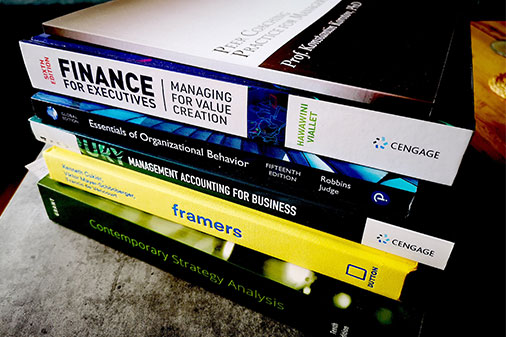
In the second residency of the executive MBA, everything was much more familiar. You know what to expect in the lessons, at least in the programs we already had before, and I already know a large part of the class. On the first day of each residency, you are assigned a new seat, which has the advantage of providing you with the opportunity to get to know each other even better within the class.
Courses
We have already completed our first courses after the first two residencies, and new courses are starting. In the second residency, Operations and Managerial Analysis & Decision-Making were added. The latter had some surprises in store. Of course, I don’t want to go into details here, as you may want to experience it for yourself. But one thing is for sure, I learned in a very illustrative way how to find a good solution. And by that, I really mean a very memorable way.
In some cases, topics that have been taught in other courses come up again. For example, in one course we talked about framing, i.e., the change in the presentation of a decision-making problem, and in the next course, we talked about framing in the more specific context of marketing positioning. Of course, this is only one of many examples. In any case, it’s a pleasure to recognize things that you learned only a short time ago. It helps you to make connections and remember the topics more easily.
Within the third residency, we will have four new subjects:
- Business Strategy
- Strategic Entrepreneurship
- Organizational Behavior
- Financial Management & Corporate Finance
Books
Before the second residency, we had the option to choose whether we wanted to receive books in a digital or physical format. I decided on the latter so that I wouldn’t have to look at my laptop so much. If you choose this option, be prepared to carry some extra luggage weight. There is a lot of knowledge packed inside. Since we have so much material to prepare, independently of the books, I will certainly have the pleasure of continuing to read even after graduation.

Assessment
As different as each professor is with their lessons, so is the assessment method. The following is a collection of the grading assignments we have had so far:
- Short tests in class
- Group work in class
- Individual assignment (Presentations:, oral and text format)
- Exam open book (Yes, you are allowed to look at all your notes and books. But time is quite short and to be honest, you have to know what to look up in the first place).
- Exam closed book
- Group assignment at home
- Forum discussions
Group work

As already shortly mentioned in one of my previous articles, the whole class was split into smaller groups to work more effectively on group assignments. Group Meitner, consisting of five students, currently meets at regular intervals. As the deadline approaches, we meet about twice a week. Otherwise, we meet about once a week.
We are currently moving from one assignment to the next. Nevertheless, the meetings are fun. We discuss a lot, learn from each other, and above all, we laugh together. It really feels like a small unit that must accomplish a mission. One of the challenges we face is scheduling. Combining all five calendars doesn’t make it easy to schedule meetings, however, somehow, we always come to an agreement.
This article was originally published on my blog here.
